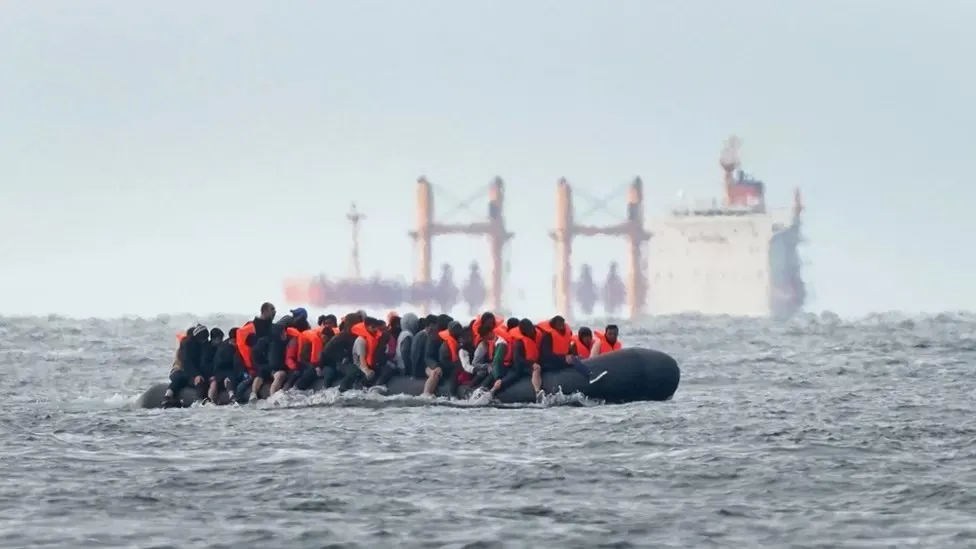Rishi Sunak is facing a crucial vote on his Rwanda bill, after two Conservative deputy chairmen and a ministerial aide resigned to rebel over the issue.
On Tuesday Lee Anderson, Brendan Clarke-Smith and Jane Stevenson stepped down to vote for changes they said would toughen up the legislation.
In a blow to the PM’s authority, 60 Tory MPs backed rebel amendments.
No 10 is confident the bill as a whole will still pass later, but is thought to be preparing to offer concessions.
MPs are set to continue debating proposed changes to the legislation – which seeks to deter Channel crossings by reviving the government’s plan to send some asylum seekers to Rwanda – in the Commons on Wednesday, with the bill put to a vote afterwards if it remains unamended.
If around 30 Tory MPs join opposition parties in voting against the bill at its final Commons hurdle, it could be defeated. So far very few Conservative MPs have explicitly committed to voting against the bill.
At least four Conservative MPs – including former ministers Robert Jenrick and Suella Braverman – have publicly said they are prepared to vote against the bill if it is not improved.
But it is unclear how many more could join them.
Chris Mason: Crunch day for the Rwanda asylum bill
Can the new Rwanda bill work and what could stop it?
What is the UK’s plan to send asylum seekers to Rwanda?
Illegal Migration Minister Michael Tomlinson Breakfast the Tory rebellion against the policy was a sign of “constructive and robust debate”.
Playing down the scale of Conservative divisions, he said: “Almost every single person, in fact every single person, who stood up on our side on the Conservative side said they want this scheme to work”.
Mr Tomlinson said he was “very sorry” that two party deputy chairmen and a parliamentary private secretary resigned, but that “each and every one of them want this policy to work”.
He said there was only “an inch between us on the Conservative benches”.
The illegal migration minister also confirmed the government was “looking at” new rules for civil servants, to make it the default assumption that orders from international courts temporarily blocking flights to Rwanda should be ignored.
The FDA union, which represents senior civil servants, is already pushing back against the idea – saying it will mean officials will be asked to breach international law.
On Tuesday, tabled amendments to the bill – which aimed to prevent any international law being used to block someone’s removal to Rwanda and severely limit an individual’s ability to appeal their deportation – were defeated.
But they still secured significant backing from senior Tories, including former home secretary Mrs Braverman and former prime minister Liz Truss.
Mr Sunak has so far resisted giving in to the demands of his critics on the right of the party – and if he did, this could risk losing support among more centrist MPs.
However, in a bid to appease some of these critics, the government is considering changing the Civil Service Code to include a presumption emergency injunctions from the European Court of Human Rights in Strasbourg are ignored.
The move is part of an attempt to quell the Conservative rebellion over Mr Sunak’s Rwanda legislation.
Even a government victory would come at a political cost, with debates over the issue exposing the extent of divisions within the Conservative Party.
A significant rebellion would also be damaging to the prime minister, who has made the Rwanda policy central to his pledge to stop small boats crossing the Channel.
Miriam Cates, one of those who voted for Tuesday’s amendments, told the BBC she would “potentially” be prepared to vote against the entire bill.
“But we’ve got 24 hours – that’s a long time in politics. We’ve got more votes tomorrow on more amendments so we’re not at that position yet where we can make that decision,” she said.
If it is approved by MPs, the government still faces a challenge to get it through the Lords, where it is likely to encounter further opposition.
How many people cross the Channel in small boats?
How is the UK stopping Channel crossings?
On Tuesday evening, Mr Sunak suffered his biggest rebellion since becoming prime minister, when 60 Conservatives defied the government to back changes to the bill put forward by MPs on the right of the party.
Shortly before the votes, Mr Anderson and Mr Clarke-Smith announced they were resigning to support the amendments.
The pair said they were not against the bill but wanted to make sure it was “watertight”.
Ms Stevenson, a parliamentary private secretary in the Department for Business and Trade, also confirmed she had offered her resignation after voting for the rebel amendments.
Labour said the resignations showed Mr Sunak was “too weak to lead his party and too weak to lead the country”.
“These resignations show that even senior Tories think that the Conservatives have failed and is yet more evidence of the total Tory chaos over their failing Rwanda gimmick – yet they are still making the taxpayer pay the extortionate price,” the party’s national campaign coordinator, Pat McFadden, said.
